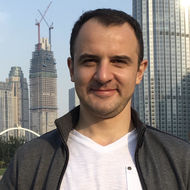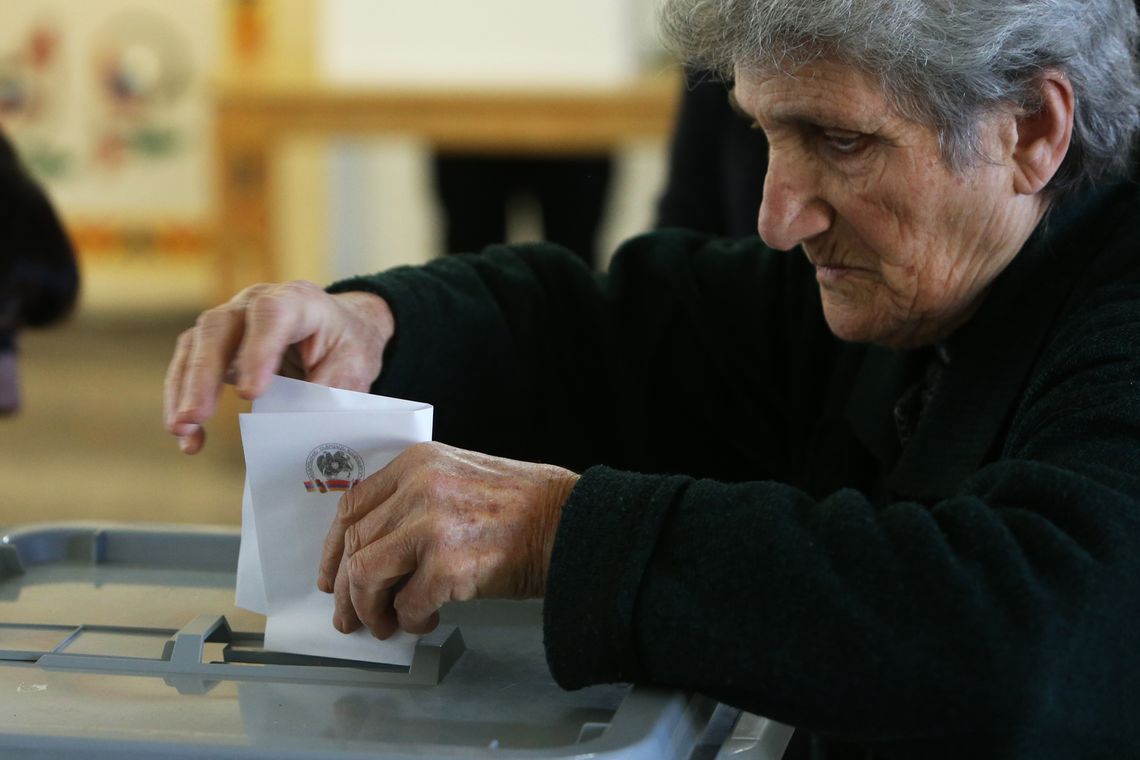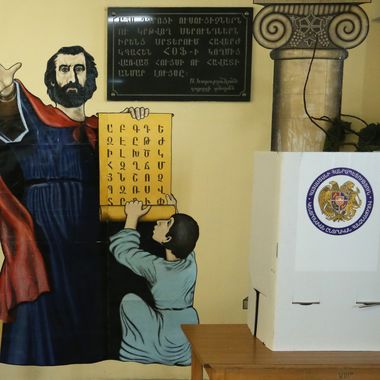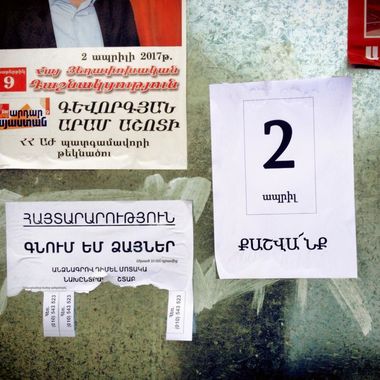Thu Mar 16 2017 · 6 min read
Foreign Policy Discourse
Comparing Election Platforms

By Vahram Ter-Matevosyan

The sixth legislative elections in Armenia are scheduled to take place on April 2, 2017. Voters will be choosing 101 members of the National Assembly from among five parties and four party blocs taking part in the election. The campaign officially started on March 5 and that same day parties released their election platforms.
Armenia is situated in a volatile region with 80 percent of its borders sealed, hence, it is important to understand how political parties and blocs look at the imbroglio and what their strategies are to deal with expanding regional uncertainties.
What are the foreign policy programs of the parties? How does each party plan to address Armenia’s relations with its neighbors? This article aims to tease out the knots and present the various positions.
The 44-page platform of the ruling Republican Party of Armenia (RPA) is built around its campaign slogan “Security and progress.” Minister of Defense Vigen Sargsyan joined the ruling party only three months ago - in November 2016, and heads the RPA parliamentary list of candidates. The parts in the program concerning the question of Armenia’s relations with its neighbors are not extensive and they are mostly declarative with a vague strategic outlook. They mostly revolve around the importance of building a reliable security architecture. It states that Armenia does not consider any nation or state as an enemy and expects reciprocity. The leader of the party has been saying that since December 2012, hence, it offers little innovative insights. The program further anticipates that Azerbaijan and Turkey “stop denying the right of the Armenians for existence, sovereignty, sustainable and secure development.” The program underscores that Armenia will continue to contribute to the consolidation of the Collective Security Treaty Organization (CSTO) and will implement its commitments within that security organization. Concomitantly Armenia aims at continuing to deepen its partnership with NATO, hoping to enhance the combat skills of its armed forces and improve civil-military relations. The section related to Iran, Georgia and Russia is quite short full and of declaratory and diplomatic formulations.
The Tsarukyan Bloc, formed on the bases of the Prosperous Armenia party, is headed by Gagik Tsarukyan, an Armenian millionaire who left politics in February 2015 to return in December 2016. This bloc is widely seen as the main contender of the ruling RPA. Its campaign slogan is entitled “It’s time for changes and construction.” Its initial 15-step program, which was officially announced weeks before the official start of the elections, has mostly offered an economic recovery program with little emphasis on foreign policy.
Primer: Parliamentary Elections in Armenia
EVN Report presents a brief summary of the April 2 parliamentary election campaign. In this primer, you can find out who the nine parties and political blocs running for office are, their campaign slogans and the top ten names on each list.
My Conquest of Armenian Identity
By Sergey Sargsyan
Irony lurks in every corner of Armenia, writes Sergey Sargsyan, the "Russian boy" who went into the voting booth and got himself a neat Armenian accent.
The foreign policy sections of campaign platforms revolve around three central questions – how to solve the Karabakh conflict, how to deal with neighbors and how to work with Russia.
The other contender to the ruling party is the Yelq Bloc (Yelq - exit in Armenian) composed of three parties (Civil Contract Party, Bright Armenia Party and Republic Party). Two of the most active MPs of the previous Assembly are leading the list of candidates - Edmon Marukyan and Nikol Pashinyan. The second in the list is former prime minister Aram Sargsyan, the brother of the former Minister of Defence and former Prime Minister Vazgen Sargsyan, who was assassinated in parliament in 1999. Yelq’s election platform covers not only Armenia’s relations with its neighbors but also lays out its vision on the resolution of the Karabakh conflict. Its platform is based on “Election, change, victory” slogan. Yelq proposed to renegotiate the Deep and Comprehensive Free Trade Agreement (DCFTA) with the EU. It also argues that Armenia’s membership in the European Economic Union (EEU) was wrong as the risks were not calculated. They believe Iran-Armenia-Georgia gas transit is a doable project. Yelq also proposes that Armenia should seek alternative security institutions and clarify relations with CSTO partners. Efforts will be made to open the Turkish-Armenian border without preconditions.
The Ohanyan-Raffi-Օskanyan coalition, which is commonly referred as the ORO Bloc, has laid out a rather comprehensive platform for elections. Its campaign slogan has two parts “It is Enough” and “Heritage, Consolidation, Victory.” It is mainly composed of two parties - the Heritage Party, headed by the first minister of foreign affairs of independent Armenia Raffi Hovhannisyan, and the Unity Party led by another former minister of foreign affairs Vartan Oskanian. The bloc was consolidated around the former Minister of Defence Seyran Ohanyan. ORO and YELQ blocs share certain similarities concerning the resolution of the Karabakh conflict. ORO bloc proposes public diplomacy and restoring power balance between Armenia and Azerbaijan. It believes that the resolution of the conflict is in Yerevan, Stepanakert and Baku and the key to it is Karabakh’s self-determination.
The Free Democrats Party, led by Khachatur Kokobelyan, has laid out a program which covers quite a wide range of questions. Its election slogan is “We Can,” which resembles U.S. President Barack Obama’s campaign slogan. The party proposes to deepen relations with Iran and Georgia as an alternative to the blockade imposed on Armenia by Turkey and Azerbaijan. The party believes that Turkish-Armenian relations should be normalized without any preconditions, and reconciliation should be achieved not through the denial of the fact of the Armenian Genocide or by hindering its international recognition. Together with YELQ, Free Democrats are clearly against Armenia’s EEU membership and are eager to renegotiate the Association Agreement with the EU.
The former Country of Law Party, which has been rebranded into the Armenian Renaissance Party, has issued a platform composed of 30 steps. The party is headed by Artur Baghdasaryan. Its platform is based around the “Vote for Change, Vote for Renaissance” slogan. It also supports Armenia’s participation in regional integration projects. It has proposed the construction of the Armenia-Iran water pipeline as well as the Iran-Armenia oil and gas pipelines. The party believes that Armenia can attract Chinese investment funds, which aim to improve the “Silk Road” infrastructure, as well as other financial resources to construct the railway between Armenia and Iran.
The Armenian Revolutionary Federation, which has built its campaign platform around the slogan “New Beginning, Just Armenia,” proposes to put the question of recognition of the Armenian Genocide and the issues of reparation in the foreign policy agenda of Armenia. It also aims to cancel the Turkish-Armenian protocols. It underlines the importance of strengthening relations with Georgia, which will be beneficial also for Armenians living in Georgia.
The Armenian National Congress formed a coalition with Armenia’s People’s Party with the “Peace, Reconciliation and Good-neighborhood” slogan. The bloc is led by former President Levon Ter-Petrosyan. The campaign platform has laid out a program which is quite different from the other contenders. It insists on the viability of the Madrid Principles of 2007 and argues that the resolution of the Karabakh conflict based on compromises is possible. Thus, this election coalition is the only political entity which openly speaks about achieving peace by yielding Karabakh’s territories to Azerbaijan. It argues that since 1994, when the ceasefire was signed to stop the war in Karabakh, 2,000 soldiers have been killed, therefore it is time to stop the current state of half-war. The relations with Turkey should be normalized without any precondition and the formation of an intergovernmental commission, which may question the fact of the Armenian Genocide, should be excluded from the agenda. This party believes that solving Turkish-Armenian and Armenian-Azerbaijani problems will allow Armenia to participate in regional integration projects.
The Communist Party of Armenia has proposed the “Fatherland, Socialism, Employment” slogan. The party claims that Armenia’s participation in the EEU is a significant factor, that can greatly contribute to Armenia’s economy, but cannot hinder Armenia’s relations with EU.
Since December 2015, when Armenia held its Constitutional referendum, it put into motion a comprehensive process that would transform the semi-presidential system into a parliamentary democracy. The upcoming legislative election is set to be a defining political event in the period of transformation into a parliamentary system which is planned to be complete by April 2018. It is a major test for Armenia’s democracy. More importantly, it is an opportunity to consolidate Armenia’s political parties as they will be playing a central role in the parliamentary democracy.
When the foreign policy platforms of nine political entities are compared, it is safe to state that they don’t offer revolutionary ideas, nor do they propose long-term foreign policy agendas. Most of them are concentrated on narrow and short-term foreign policy issues.
The foreign policy sections of campaign platforms revolve around three central questions – how to solve the Karabakh conflict, how to deal with neighbors and how to work with Russia.
These questions have played a central role in Armenia’s domestic discourse since independence and most likely will continue to be present for the coming years if not decades.




